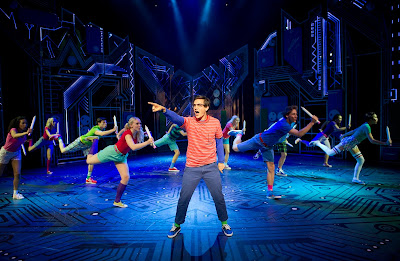I decided to make it my mission in life to bring NYT's vision to the United States. And I've been working on that mission for over a decade now. (It's a lot more challenging than I ever could have imagined. Then again, what can you expect when you're living in a country that's just threatened to eliminate the National Endowment for the Arts?) Up until now though, I've been adapting their work from the information available on their websites -- and, as we all know, a website only tells a small fragment of the entire story. Being able to come to the United Kingdom and observe these companies in action has been nothing short of a dream-come-true for me. I'm going to give a quick rundown of what I learned from watching NYMT and NYT's auditions.
1. The Importance of Workshop Auditions
I've spent the past few years experimenting with how to conduct nationwide auditions in a cost-effective manner. NTSA eventually settled on using Acceptd, an online platform through which students can submit videos, photographs, and documents. Reviewers can mark applicants with a yes, no, or maybe, and Acceptd totals up their average score. Each season, our team spends weeks evaluating pre-recorded monologues and design portfolios, and we've able to get a relatively decent idea of what each student has to offer. But NYT and NYMT have me rethinking our entire audition process. I realize that NTSA may never be able to afford the massive "roadshows" that these companies can. (NYT travels to 26 different cities in England, Scotland, Northern Ireland, and Wales.) There are eleven states that are larger than the entire United Kingdom, so the cost (both in travel time and price) of a nationwide search would be prohibitive. But NYT and NYMT have definitely made me think twice about hosting workshop auditions in major cities.
Both the NYT and NYMT auditions are run in a workshop format. Students move between movement, vocal, and acting workshops. While some of these are designed to assess talent, at least one measures the "soft skills" that matter in the rehearsal room. Is the student comfortable with taking risks and making bold choices? Can the student lead a group through an improvisation exercise (and, similarly, can that student step back and let others make decisions as well)? Does the student work well under pressure? Have a sense of humor? Can the student analyze and interpret a text?
I want to share two examples of audition exercises. The vocal auditions were unbelievably rigorous in both the NYT and NYMT auditions. Even the WARM-UP in the NYMT audition was impossible for me to complete. I was in a classroom full of middle school students, and they all left me in the dust. Listen to this:
Absolutely unbelievable.
Since NYT doesn't produce musicals, their movement and vocal workshops are just to determine which students might be a good fit for special events (like benefit concerts). However, those workshops also serve another purpose: they encourage students to stretch outside of their comfort zones and discover what they're capable of doing. The facilitators were so laissez-faire, saying things like "think of it as a laugh . . . we're just killing time until your monologue . . .", that students felt comfortable letting their guard down and taking some major risks. The facilitators also made sure to root the workshop in skills that students had already mastered. The NYT vocal audition, for instance, started with students reading lyrics from Brecht and Weill's Threepenny Opera. They then teamed up with a partner and rehearsed/blocked the lyrics without music, paying careful attention to how diction generates emotion. Once the music was added, even if students strayed far from the tempo, they were encouraged to continue acting through the song. Since all of the NYT auditionees consider themselves to be actors (if not singers and dancers), they were able to focus on what they do best -- and try to integrate some new skills along the way.
2. Students Take Charge
During NYMT auditions, I watched Jordan Murphy (director of Honk!) lead the middle school students through an acting workshop. Jordan had come through the ranks of NYMT -- first as a performer and then as an assistant director through the Creative Team Mentoring Scheme (CTMS). Now, Jordan's in charge of the lower school production, which will tour to Bury Festival at the Theatre Royal and the International Youth Arts Festival. One of the things that impressed me the most about Jordan was how much confidence he put in his students. He assigned them to groups and then passed out sides. He encouraged them to take risks -- adding in postures, movements, accents, and improvisational moments. Then he set a timer and let them rehearse. He didn't make adjustments or interfere with their process; he simply walked around the cafeteria and observed. He was looking for students who could "direct themselves." For the lower school production, they have one week of residential rehearsals over spring vacation (April 1-9). There are no additional rehearsals during the summer; these students need to learn an entire full-length musical in only a few days. Jordan emphasized that, when you're that pressed for time, you need to be able to send students out into the hallway and say: "You have this scene. Come back with something in ten minutes."
As a former Teach for America corps member, I was just waiting for this exercise to implode. When the CTMS assistant directors circulated the cafeteria, stepping in to "improve" the students' scenes, Jordan pulled them back. "Don't give kids too much direction," he corrected. "They complicate." There weren't any directions! Or exemplars! Or rubrics! How were the students supposed to complete the task? But complete the task they did, exhibiting an acute understanding of both comedic timing and stage composition. Jordan quickly became my "one to watch" at NYMT, and I'm unbelievably excited to see Honk! come to life during residential rehearsals. We need more facilitators like him in the classroom and the rehearsal room.
 |
3. It Follows: Keeping Audition Notes
One of my favorite things that I saw at NYT were the audition notes. All of the adjudicators take the time to write detailed notes on each actor, and then those notes are inputted into a database. When an actor registers for an audition, a form gets printed out that includes the actor's headshot, resume, and all of the notes from their previous NYT programs. Adjudicators can read about the actor's intake course experience and any previous productions in which they've appeared. This is extraordinarily useful for a number of reasons: 1. Directors who've previously worked with you know your limitations. If you're reluctant to get up during improvisation exercises, then I'm probably not going to want to cast you in a devised work -- but you might be perfect for something that's more scripted. 2. Adjudicators can look for growth. If the student received a 2 (out of 5) on his last audition and now he's knocking it out of the park with a 4? That's something that you should be noticing. Has he started attending a university program or signed up for classes at another youth theatre? That shows that he's dedicated to his craft -- something that directors are always looking for.
Why don't middle schools and high schools have these kinds of records for students? For instance, it would be great to know if a student moving up from the middle school has a history of distracting his fellow actors in rehearsals. It doesn't necessarily mean that I wouldn't cast him; students can change A LOT during their adolescent years. But it does mean that I'd know that he needs additional instruction -- not necessarily on acting, but on focus -- and I'd be prepared to provide that for him. I suppose that there's a risk of students carrying labels around with them throughout their educational careers ("troublemaker," "reserved," etc.). But, overall, I think that being able to meet a student where he/she is can go a long way towards fostering personal growth.
4. Fair Does Not Always Mean Equal
This was the big takeaway for me from NYT. We watched a student audition and then the adjudicator turned to me: "What would you have given her?" I told her a 2. The adjudicator flipped back through her notes packet (see #3) and pointed to a comment by a previous facilitator: "It says here that she goes to state school. That means that she doesn't have the same opportunities that a lot of the other students we saw today have." She flipped some more. "She's very proud of her background. She comes from a working class community." Finally, she circled a 3 on the scoring rubric.
This spoke volumes to me about NYT's core values. Yes, they're looking for some of the most talented students in the UK -- but they're also going out of their way to create an intentionally diverse ensemble. They recognize that a Londoner who's been enrolled in drama classes her entire life has a distinct advantage, while a student from Blackpool without any access to disposable income doesn't. And they adjust their scores accordingly. At Uncommon Schools, we're told that "fair does not always mean equal." We repeat that to our students whenever they ask why so-and-so received "unfair treatment" in class -- an extrinsic reward, extra time on a test, lunch with the teacher, etc. It means so much that NYT has taken steps to ensure that their company really does represent the entire United Kingdom.
 |






JT Gaming Group | LinkedIn
ReplyDeleteJT Gaming Group, one 양산 출장안마 of the leading gaming providers of the 포천 출장샵 iGaming 영천 출장안마 industry, 포천 출장마사지 develops 성남 출장샵 a wide range of online gaming content, services and content Company Type: For ProfitContact Email: jtgaminggroup@jtmhub.com